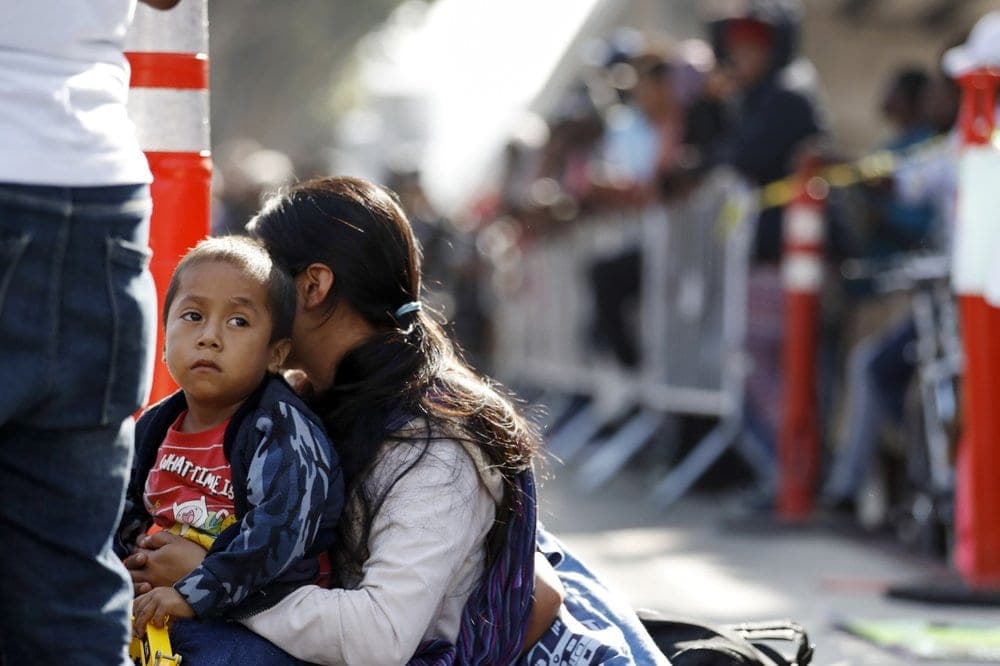NEW YORK — In the first couple of months after a federal judge ordered the Trump administration last year to stop separating most parents and children at the U.S.-Mexico border, the number of children sent to New York fell.
Then, advocates say, the children started coming again in a steady stream, many too young to understand their circumstances or how to find their parents.
“It’s just been this horrible sense of deja vu,” said Anthony Enriquez, director of the unaccompanied minors program for the Archdiocese of New York’s Catholic Charities Community Services. The organization is among the advocacy agencies around the country that have joined in a filing from the American Civil Liberties Union that says more than 900 children were taken from parents in the year after the judge issued the injunction.
It’s “the same problem that we had over a year ago prior to the injunction that we hoped against hope would be stayed by the court,” he said. “But the government seems to not care about the court’s order, frankly.”
The 911 children were separated from 844 parents between the court order issued on June 26, 2018, and June 29 of this year, according to the ACLU’s analysis of government records it received under the judge’s supervision. The Justice Department declined to comment.
More than half, or 481 children, were under 10. And 1 in 5, or 185 children, was under 5. Thirteen were less than a year old. The median age was 9.
Nearly 3 of 4 children, or 678, were separated on grounds of a parent’s criminal conduct, but only half of those cases indicated a conviction in records produced by the government, according to the ACLU analysis by data specialist Brooke Watson.
A parent’s “traffic or driving-related violations” accounted for 47 child separations, including three for driving under the influence and 14 for DUI combined with an unspecified traffic violation.
Advocates said they filed their complaint because of concerns that the government was not complying with last summer’s court order barring family separations, according to Lisa Kroop with the National Immigrant Justice Center, or NIJC. Her Chicago-based organization represents families in roughly 120 separation cases, including about 20 mothers from El Salvador detained at a facility in Laredo, Texas.
Advocates found that in nearly all the cases from El Salvador, women who were fleeing gang violence were falsely accused of gang activity. Most of the women had cleared the first hurdle in seeking asylum by being able to demonstrate credible fear of returning to their home countries.
“The things that make them asylum seekers are being used against them,” Kroop said.
The NIJC has been able to produce paperwork for several clients showing their innocence and reuniting several families.
“These individuals have no criminal record, and yet these are mothers who have languished in immigration jails away from their kids for months on end,” Kroop said. “They are suffering so much.”
Others are still separated.
In one case, a nursing child was forcibly removed from her mother, according to Kroop. The mother, who entered the U.S. from El Salvador in March, had been prosecuted on a minor drug charge after being forced to deliver a small amount of marijuana, roughly 33 grams, to a gang-member who had beaten and raped her. The mother was sentenced to time served and community service, but the government appealed without notifying her, and she faces 10 years if she returns as a “result of this sham appellate process,” Kroop wrote.
The child, who turned 2 the day they arrived in the U.S., has been placed with friends in Iowa, where she continues to cry for her mother at night. One night the toddler was sleepwalking and tried to nurse by sucking on her caregiver’s arm, according to Kroop.
“It just feels like gratuitous cruelty,” Kroop said. “There is no discernable child welfare reason to be doing this.”
The government has reunited 97 children with their parents, after having been separated a median length of 85 days. The government lists 40 children who were released to “other distant relatives” or “unrelated sponsors.” Two 1-year-olds were reunited with their parents after five months apart.
The majority are in the custody of the U.S. Health and Human Services Department.
Enriquez said advocates hoped the ACLU filing would lead to the judge giving more specific instructions to the government.
The government “doesn’t seem to have the will to want to stop this or repair the damage it’s caused.” So it will be up to the judge to order with more specificity “how we can begin to bring these families back together,” he said.
Tareen reported from Chicago. Associated Press Writer Elliot Spagat in San Diego contributed to this report.
Crux is dedicated to smart, wired and independent reporting on the Vatican and worldwide Catholic Church. That kind of reporting doesn’t come cheap, and we need your support. You can help Crux by giving a small amount monthly, or with a onetime gift. Please remember, Crux is a for-profit organization, so contributions are not tax-deductible.











